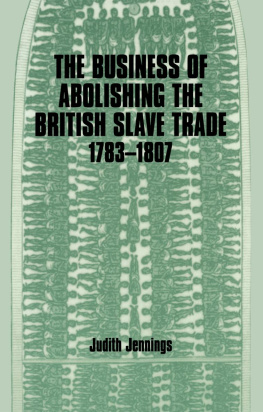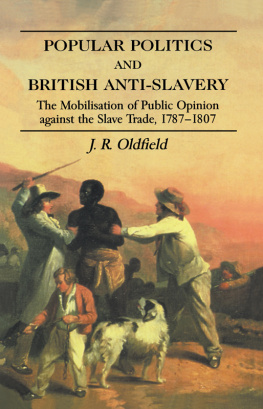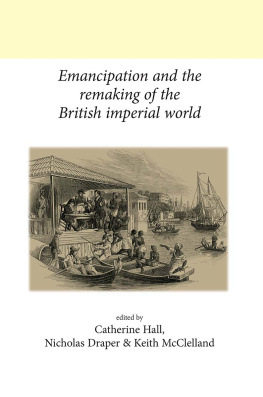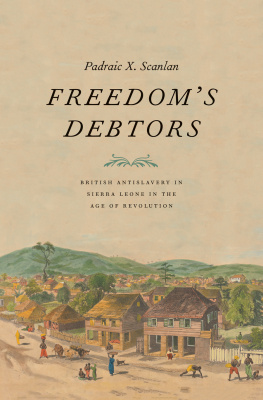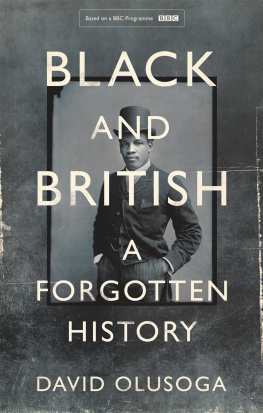Principles and Agents
THE DAVID BRION DAVIS SERIES
SINCE ITS FOUNDING IN 1998, the Gilder Lehrman Center for the Study of Slavery, Resistance, and Abolition, which is part of the MacMillan Center for International and Area Studies, has sponsored an annual international conference on major aspects of slavery, its ultimate destruction, and its legacies in America and around the world. The Centers mission is to increase knowledge of this story across time and all boundaries, and to reach out to the broader publicin schools, museums, and historic sites, and through filmmakers and general readerswhere there is a growing desire to understand race, slavery, abolition, and the extended meanings of this history over time.
In the name of David Brion Davis, the founder of the Center, Sterling Professor Emeritus at Yale, and the worlds leading scholar of slavery in international perspective, we have established an occasional lecture series. A single distinguished scholar, or a group of noted writers on a subject, is invited to speak on a theme out of which we then produce an original book such as this one.
Because the research, discoveries, and narratives presented at our conferences do so much to enrich our knowledge of one of humanitys most dehumanizing institutions and its place in the founding of the modern world, as well as of the first historical movements for human rights, we are immensely grateful to Yale University Press for engaging in this joint publication venture. The Gilder Lehrman Center is supported by Richard Gilder and Lewis Lehrman, generous Yale alumni and devoted patrons of American history. The Center aspires, with Yale University Press, to offer to the broadest possible audience the best modern scholarship on a story of global and lasting significance.
DAVID W. BLIGHT
Class of 1954 Professor of History at Yale University, and Director,
Gilder Lehrman Center for the Study of Slavery, Resistance, and Abolition
Principles and Agents
The British Slave Trade and Its Abolition
David Richardson

Published with assistance from the Annie Burr Lewis Fund.
Published with assistance from the foundation established in memory of Amasa Stone Mather of the Class of 1907, Yale College.
Copyright 2022 by David Richardson.
All rights reserved.
This book may not be reproduced, in whole or in part, including illustrations, in any form (beyond that copying permitted by Sections 107 and 108 of the US Copyright Law and except by reviewers for the public press), without written permission from the publishers.
Yale University Press books may be purchased in quantity for educational, business, or promotional use. For information, please e-mail (UK office).
Set in Monotype Bulmer by Westchester Publishing Services.
Library of Congress Control Number: 2021932825
ISBN 978-0-300-25043-5 (hardcover : alk. paper)
A catalogue record for this book is available from the British Library.
This paper meets the requirements of ANSI/NISO Z39.48-1992 (Permanence of Paper).
Contents
Acknowledgments
SOME OF THE ideas underlying this book were first raised in the David Brion Davis Lectures I delivered at Yale University in March 2007 under the same title as that of this book. Their delivery coincided with the bicentennial of the abolition of the British slave trade in March 1807. The lectures were intended to throw light on a question that had fascinated historians across the intervening two centuries: why Parliament chose in 1807 to outlaw an economic activity in which Britain had proved preeminently successful in the preceding 150 years. In this book, I elaborate on the reflections in 2007. Sadly, David Brion Davis, who attended the lectures, died before I completed the book. It has nonetheless benefited from suggestions David offered at the time the lectures were delivered. Like so many others, I remain in admiration of the standard of scholarship on slavery that his work embodied and grateful for the encouragement he gave to those who have tried to walk in his steps. In working on this book, I have realized the scale of that task.
Readers of this book will soon understand how much I owe to others with whom I have collaborated in publishing some of the studies cited herein. They include Steve Behrendt, David Eltis, the late Frank Lewis, Paul Lovejoy, Robin Pearson, and Joel Quirk. I have benefited, too, from conversations and discussions with Seymour Drescher, Stan Engerman, John Oldfield, and Judith Spicksley about several issues. In the case of the last two, the conversations took place as colleagues at the Wilberforce Institute at Hull, as did work on the papers I have published since 2004 with Robin Pearson and Joel Quirk. All four have influenced my thinking more than they imagine, and I thank them for their continuing collegiality and interest in my work. None bear any responsibility for errors of fact or interpretation contained in this book. I am grateful also to Nick Evans, another Hull colleague, and to Suzanne Schwarz for allowing me to use unpublished material from their joint research to inform my arguments in .
I conceived the idea of writing on British abolitionism in 2004 when I was a visiting scholar at Yales Gilder Lehrman Center for Slavery, Abolition, and Resistance and had opportunities to discuss issues relating to it with David Brion Davis. David Blight, Daviss successor as the centers director, helped me to begin to crystallize my thoughts by inviting me to deliver the 2007 David Brion Davis Lectures. He then encouraged me to write up the lectures for several years after they were delivered. That process has been made easier by unfailing support from editor Adina Berk of Yale University Press. Adina commissioned valuable and constructive reports on an initial manuscript submitted almost three years ago. Since then she has displayed exemplary patience and offered important insights into the structuring of the manuscripts argument that allowed me to transform that initial text into a publishable one. I am extremely grateful to David and to Adina and others on the Yale team, notably Laura Jones Dooley, Ash Lago, and Susan Laity, for their sustained support and encouragement in bringing this book to fruition.
Last, but most important, I express huge, heartfelt thanks to Susan, my wife and companion in life for over a half a century. Throughout my academic career she has offered constant moral support and encouragement to all my research endeavors. None has been more important than in the past few years as I have worked to complete this book. She is not a historian, but without her love, her sacrifice of time together, and her patient acceptance of my mental distractions, this book, like so many others of my scholarly projects, could not have been completed. I dedicate this book to her and our son, John, in pride at their own achievements.
Introduction
Interpreting British Slave Trade Abolition
Personalities, not principles, move the age.
Oscar Wilde, The Picture of Dorian Gray, 1891
THE DECISION OF Parliament in 1807 to outlaw Britains trafficking of enslaved Africans has widely been considered a seminal moment in modern history. One nineteenth-century historian, W. E. H. Lecky, deemed Britains crusade against slavery, which the act of 1807 effectively launched, among the three or four perfectly virtuous acts recorded in the history of nations, a view that historian David Brion Davis considers still to have much merit.
Yet therein lies a puzzle with which historians have wrestled almost from the very moment that Parliament proscribed British slave carrying in 1807. Contemporary opponents of that measure claimed that slave carrying and the production of British colonial goods that depended on the traffic in enslaved Africans had itself elevated Britain from 1640 onward into the front rank of European nations. Later historians raised such arguments to an even higher plane, claiming that profits and wealth from Caribbean slavery and the slave trade from Africa fertilized British industrial capitalism.
Next page




